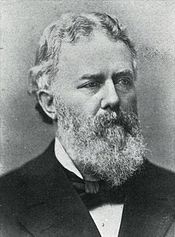Matthew Deady
| Matthew Deady | |
|---|---|
 |
|
| Judge for the United States District Court for the District of Oregon | |
|
In office March 9, 1859 – March 24, 1893 |
|
| Nominated by | James Buchanan |
| Preceded by | new position |
| Succeeded by | Charles Byron Bellinger |
| 7th Associate Justice of the Oregon Supreme Court | |
|
In office 1853–1859 |
|
| Nominated by | Franklin Pierce |
| Preceded by | William Strong |
| Succeeded by | Paine Page Prim |
| President of the Oregon Territory Council | |
|
In office 1852–1853 |
|
| Preceded by | Samuel Parker |
| Succeeded by | Ralph Wilcox |
| Personal details | |
| Born | May 12, 1824 Easton, Maryland |
| Died | March 24, 1893 (aged 68) Portland, Oregon |
| Spouse(s) | Lucy A. Henderson |
Matthew Paul Deady (May 12, 1824 – March 24, 1893) was a politician and jurist in the Oregon Territory and the state of Oregon of the United States. He served on the Oregon Supreme Court from 1853 to 1859, at which time he was appointed to the newly created federal court of the state. He remained on this federal trial level court, the United States District Court for the District of Oregon in Portland, Oregon, as the sole judge until his death in 1893. While on the court he presided over the trial that led to the United States Supreme Court decision of Pennoyer v. Neff concerning personal jurisdiction.
Prior to joining the court, Deady served in the legislature of the Oregon Territory, including time served as the President of the Council, and was elected as President of the Oregon Constitutional Convention in 1857. A native of the state of Maryland, his first profession was as a blacksmith. He would also spend time as a teacher in both Ohio and Oregon. Deady read law in Ohio and practiced law for a time in that state before immigrating to the Oregon Territory via the Oregon Trail. In Oregon, he helped codify the laws of the state and assisted in the foundation of the Multnomah County Library in Portland. He also was president of the University of Oregon's board of regents. The university renamed Deady Hall in his honor after his death.
...
Wikipedia
